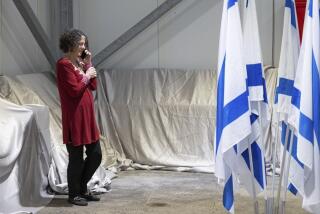Tension, Heartache : Wife of Tehran Hostage Ready to Aid Families
- Share via
WASHINGTON — Penne Laingen remembers the night almost six years ago when, overwhelmed by stress, she accidentally sprayed her hair with furniture polish instead of hair spray. It was a time of tension and heartache while her husband, diplomat L. Bruce Laingen, was held hostage in Iran.
Now, recalling that ordeal as another group of Americans has become captive in the Middle East, she and her husband have offered to counsel families of the men being held in Beirut.
“The thing the State Department can do for them is give them substantive information,” she said Wednesday. “What we can help them with is what they’re feeling.”
Laingen said that she and the families of the other Americans held in Iran were strengthened during the ordeal by talking with former Vietnam POWs and their wives.
“It was very good for us to talk to someone who had lived through trauma--years of it, and much worse than our men had--and survived,” she said. “It gave us confidence that our husbands would get through it.”
444 Days of Captivity
Bruce Laingen, former charge d’affaires in Tehran, was one of 52 Americans held for 444 days in the Iranian capital. However, he was kept in “protective custody” in the Iranian Foreign Ministry, separate from most of the others. All were released on Jan. 20, 1981.
Laingen, now vice president of the Defense Department’s National Defense University, said that as soon as the events in Beirut began to unfold, he contacted the State Department.
“I said to them, ‘If my dealing with the families would be helpful to you, I’m ready to do it--I’ll do anything you want,’ ” he said. “But it’s even more important coming from one of the wives. They know what it was like back here.”
Penne Laingen, who was the first to hang a yellow ribbon outside her house during the Tehran crisis--and has done so again--said she will be accessible to hostage families if they want to talk. And, she said, she has also spoken to several of the other wives of Iranian hostages about doing the same.
“We don’t want to institutionalize this,” she emphasized. “We’d like to keep it personal and informal. I’m not a professional. I’m just an empathetic person.”
Problems With Children
Recalling her own emotions, Penne Laingen said she felt she could share lessons from her own experience on how to deal with stress, problems with children--and what to expect when the men come home.
“It’s wrong to think you will go back to your normal routine,” she said. “Each of you will be changed. It’s important to be prepared for that; then, the aftershock is not so great.
“For the men, it’s been like being in a closet. So, when they come home, they’re in a dream world--a ‘hostage high,’ I call it.
“In the meantime, you’ve been besieged--and you want to go into a closet. So you’re at cross-purposes. You have to have a great deal of love and compassion for them. And you have to go with the flow.”
During the parents’ absence, she said, young children may suffer unusual reactions, such as bed-wetting or a return to thumb-sucking.
Formed Aerobics Class
“Their problem is fear of abandonment,” she said. “They are not as worried about Daddy’s physical harm as they are about being deserted. The parent at home has to say, ‘I’m here to take care of you’ and reassure them, without overdoing it.”
During her ordeal, Penne Laingen said, her blood pressure rose. To deal with that and other symptoms of stress, she and the other wives formed an aerobics class.
“And it helps to get away,” she said. “You’re afraid to leave, but you shouldn’t feel guilty. Go off and get some tranquility. It’s very important.”
During the Tehran crisis, she said, “we found that the mere presence of a person with empathy was helpful.”
Thus, she added, “I’m here to listen.”
More to Read
Sign up for Essential California
The most important California stories and recommendations in your inbox every morning.
You may occasionally receive promotional content from the Los Angeles Times.













